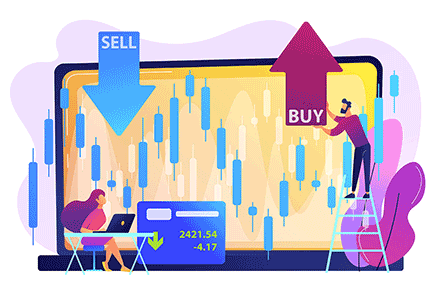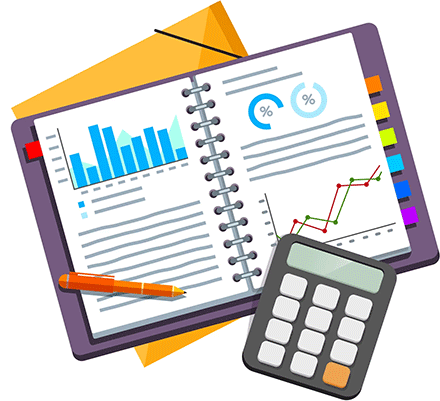Navigating the vast waters of the forex market in 2023 necessitates not just a robust strategy and keen market insight, but also a dependable partner to facilitate your trades: a forex broker. With the industry seeing a continual surge in participants, choosing the trusted forex broker becomes paramount for both seasoned traders and novices alike. This introduction aims to illuminate the key considerations to keep in mind when embarking on this pivotal decision-making journey.
Firstly, the technological advancements of the past decade have altered the landscape of forex trading, making it even more crucial to choose a broker who offers an intuitive, secure, and feature-rich trading platform. With the market's constant flux, real-time data, quick execution speeds, and a user-friendly interface can make the difference between capitalizing on an opportunity and missing it.
Selecting the right Forex broker from the multitude of options available can be a daunting and time-consuming task. To streamline this process, we have rigorously tested and reviewed numerous leading Forex brokers, compiling our insights into comprehensive Forex broker reviews. However, we don't want you to rely solely on our assessments. Our Forex broker reviews also include feedback from real traders, empowering you to make informed decisions comfortably.
The Fundamental Criteria for Choosing a Broker
Choosing the best Forex broker for your needs involves considering several key factors. First and foremost, ensuring the safety of your funds is paramount. To achieve this, focus on two critical aspects:
- Regulation: Your chosen broker should be based in and regulated by a respected financial authority in a reputable financial center. This ensures the broker operates transparently and adheres to stringent financial standards.
- Fund Protection: Opt for brokers whose regulators offer deposit protection for clients. In case the broker faces financial difficulties or goes bankrupt, this safeguard guarantees the recovery of your deposit up to a certain amount.
Furthermore, assess the broker's financial stability and reputation to bolster your confidence in their reliability.
Once you've secured your funds, evaluate other essential factors:
- Range of Available Assets: Consider the variety of assets available for trading, as it should align with your investment goals and strategies.
- Spreads and Commissions: Analyze the broker's spread and commission structure. Dealing Desk brokers typically charge spreads, while ECN brokers charge spreads and commissions. Assess how these costs impact your trading profitability.
- Overnight Financing Charges: If you plan to hold positions overnight, examine the broker's overnight financing charges. These fees can vary significantly between brokers and affect your overall trading costs.
- Trade Execution Speed and Reliability: Efficient trade execution is crucial. Evaluate the broker's track record for executing trades swiftly and reliably.
Different Types of Forex Brokers: A Comprehensive Guide
Choosing the right forex broker is a pivotal decision for anyone venturing into retail forex trading. It not only impacts the quality of service you receive but also affects your transaction fees and dealing spreads. To make an informed choice, one must understand the three primary types of forex brokers available: No Dealing Desk (NDD), Market Makers, and Electronic Communications Network (ECN) brokers.
No Dealing Desk (NDD) Forex Brokers
NDD forex brokers, as the name suggests, operate without a traditional dealing desk. Instead, they source their liquidity from multiple forex quote providers, offering clients the best composite quotes available in the market.
Here's how NDD forex brokers typically function:
- Multiple liquidity providers post their best markets with the NDD broker.
- The broker executes client transactions and fills orders based on these market quotes.
- NDD brokers may charge a commission, widen the bid/ask spread, or employ a combination of both to generate revenue from each trade executed.
NDD brokers are favored for their transparency, as they often provide direct access to the interbank forex market. This type of broker appeals to traders seeking competitive pricing and order execution quality.
Market Maker Forex Brokers
Market makers, unlike NDD brokers, offer a two-sided market derived from an in-house specialist forex trader operating at the broker's dealing desk. When a client places an order, the market maker takes the other side of the trade, either buying on the bid side or selling on the offer side of the quoted price.
Key characteristics of market maker forex brokers:
- They aim to profit from the spread between the bid and ask prices.
- Market makers may offset trades immediately, especially for large orders or if they anticipate market movements against their position.
- For smaller trades, market makers may add the trade to their trading book, managing the risk based on market conditions and their outlook.
Market makers provide liquidity to the market, ensuring traders can execute orders quickly. However, concerns about potential conflicts of interest exist, as market makers may profit when traders incur losses.
Electronic Communications Network (ECN) Forex Brokers
ECN forex brokers do not maintain a dealing desk. Instead, they offer electronic trading platforms where professional market makers, banks, traders, and other participants can enter bids and offers directly into the system.
Key features of ECN forex brokers:
- ECNs often offer anonymity to traders posting prices, catering to those who prefer not to reveal their positions.
- Participants on ECN platforms can interact with each other directly, resulting in potentially tighter spreads.
- ECNs are known for transparency, displaying real-time market depth and order book information.
ECN brokers are favored for their transparency and competitive pricing, with traders benefiting from direct access to a vast pool of liquidity providers. However, they may charge a commission on trades.
Understanding the different types of forex brokers is essential for traders to select the one that aligns with their trading preferences and objectives. NDD brokers offer transparency and competitive pricing, market makers provide quick execution and market access, while ECN brokers combine transparency with a vast network of liquidity providers. Ultimately, the choice depends on individual trading styles and priorities, making it crucial to weigh the pros and cons of each broker type before making a decision.
The type of broker you choose can significantly influence your trading performance:
- Dealing Desk Brokers: These brokers operate like financial institutions, offsetting trades internally. While they offer convenience, they may present a conflict of interest.
- ECN (Electronic Communications Network) Brokers: ECN brokers provide direct access to market participants through an electronic network. They often offer tighter spreads and eliminate conflicts of interest.
It's essential to verify that brokers claiming to be ECN providers genuinely operate as such.
Fees and Commissions
Brokerage fees play a vital role in your overall trading costs. Understanding the difference between fees and commissions is key:
- Fees: Fixed charges for specific services.
- Commissions: Variable charges based on the financial product and transaction size.
Ensure you select a broker with transparent pricing and carefully examine the costs associated with your preferred trading style.
Additional Services and Premium Features
Some brokers offer premium services and features, including research, retirement advice, and tax planning. If these services align with your needs, consider them when choosing a broker. However, balance the benefits against the additional costs.
- Customer Service. Efficient customer service is crucial for resolving any issues that may arise. Assess the expertise, availability, and responsiveness of a broker's customer service team. Prompt and knowledgeable support can make your trading experience smoother.
- Trading Platforms. A user-friendly trading platform is your gateway to the markets. Ensure the broker offers a platform that meets your requirements in terms of ease of use, speed, and functionality.
- Ease of Deposit and Withdrawal. Check the broker's deposit and withdrawal options, as well as their processing times. Quick and easy access to your funds is essential.
- Minimum Balances. Consider the minimum balance required to maintain your account. A lower minimum balance is often more favorable, especially for new traders.
- Instruments. Evaluate the range of trading instruments offered by the broker. Commodities, stocks, indices, and currency pairs are common trading instruments. Ensure the broker provides the assets you intend to trade.
Broker Comparison
To make an informed decision, compare multiple brokers based on your trading style, budget, and preferences. Tailor your selection to your specific needs.
Determining Your Trader Profile
Your trader profile influences your choice of broker. Different trading styles and deposit amounts suit various broker types:
- Position Trader: Suitable for long-term traders who hold positions for weeks or months.
- Swing Trader: Ideal for those who hold positions for hours or a few days.
- Day Trader: Suited for traders who buy and sell within the same day, often utilizing leverage for quick gains.
- Scalper: For traders who capitalize on small price movements with numerous rapid trades.
Selecting the right Forex broker is a pivotal decision that significantly impacts your trading success. Prioritize safety through regulation and fund protection. Consider trading costs, available assets, and the broker's services. Tailor your choice to your trading style and preferences, ensuring a seamless and profitable trading experience. Remember, thorough research is essential to making the best-informed decision for your Forex trading journey.
Regulatory Compliance
Selecting a Forex broker is a critical decision for traders, and one of the primary factors to consider is the regulatory status of the broker. Trading with an unregulated Forex or CFD brokerage can expose traders to significant risks, potentially leaving them with no recourse in case of losses resulting from dishonest or incompetent practices. In this article, we'll delve into the importance of broker regulation and outline some major regulatory bodies by country, summarizing their key regulatory laws.
The Significance of Broker Regulation
For traders, the regulatory status of a Forex broker is paramount. Here's why it matters:
- Investor Protection: Regulatory bodies establish rules and standards that Forex brokers must adhere to, including the segregation of client funds from the broker's operational capital. This separation safeguards traders' funds, reducing the risk of misuse or misappropriation.
- Transparency: Regulations often require brokers to provide clear and accurate information about their services, fees, and associated risks. This transparency empowers traders to make informed decisions and minimizes the chances of deceptive practices.
- Financial Stability: Regulated brokers are obliged to maintain a minimum level of capital adequacy. This capital acts as a buffer against unexpected losses, ensuring that brokers have the financial resources to fulfill their obligations to traders.
- Fair Practices: Regulatory frameworks prohibit brokers from engaging in unfair trading practices such as price manipulation, front-running, or insider trading. This fosters a level playing field for all market participants and promotes transparent price discovery.
- Dispute Resolution: Regulated brokers typically have formal mechanisms for handling customer complaints and resolving disputes. This provides traders with an avenue to seek redress in case of conflicts with their brokers.
Major Regulatory Bodies by Country
Regulatory authorities play a crucial role in overseeing the activities of Forex brokers. Here are some of the key regulatory bodies by country, along with a summary of their regulatory laws:
- United Kingdom - Financial Conduct Authority (FCA): The FCA is renowned for its stringent regulatory framework. It mandates brokers to follow strict rules on capital adequacy, client fund segregation, and transparent disclosure. The FCA also enforces robust investor protection measures.
- Cyprus - Cyprus Securities and Exchange Commission (CySEC): CySEC regulates brokers operating within the European Union. Under MiFID regulations, CySEC ensures harmonized standards for investment services across EU member states.
- United States - National Futures Association (NFA): The NFA oversees Forex brokers in the U.S. It imposes rigorous compliance requirements, including capital adequacy rules and strict codes of conduct. Forex brokers operating in the U.S. must adhere to NFA regulations.
- Australia - Australian Securities and Investments Commission (ASIC): ASIC is responsible for regulating Forex brokers in Australia. ASIC-regulated brokers must meet high standards of transparency, risk management, and client protection.
- European Union - Markets in Financial Instruments Directive (MiFID): MiFID ensures uniform regulation of investment services across EU and European Economic Area member states. Forex brokers operating in the EU must comply with MiFID standards, providing a high level of protection for traders.
Verifying Broker Regulation
To confirm a Forex broker's regulatory status, follow these steps:
- Check Broker's Website: A regulated broker will prominently display the name of the regulatory authority on its website. This information should be easily accessible to visitors.
- Head Office Information: If the broker's website lacks regulatory details, it should at least provide the address of its head office. This can help you identify the jurisdiction under which the broker operates, enabling you to search for the relevant regulatory body.
- Regulatory Body Website: Visit the website of the regulatory authority associated with the broker's jurisdiction. Most regulatory bodies maintain lists of regulated Forex brokers. Search for the broker's name to verify its regulatory status.
Understanding broker regulation is crucial for safeguarding your investments in the Forex market. Regulatory bodies establish guidelines that promote transparency, financial stability, and fair practices among brokers. When choosing a Forex broker, prioritize regulated entities and conduct due diligence to verify their regulatory status, ensuring a secure and transparent trading environment. Remember that regulatory compliance is non-negotiable for a safe and reliable trading experience.
Prominent, credible Forex Regulators ensure safety and integrity.
- Ensure the broker is registered with leading regulatory authorities like the U.S. Commodity Futures Trading Commission (CFTC), the UK's Financial Conduct Authority (FCA), or the Australian Securities and Investment Commission (ASIC).
- Regulatory compliance ensures that the broker maintains fair trading practices and adequate financial security.
Trading Platforms & Technology
The trading platform is your gateway to the forex market, the interface between the trader and the markets. Choose a broker that offers a user-friendly and stable trading platform, preferably one you can practice with via a demo account.
- Most brokers offer platforms like MetaTrader 4 or 5, but some may have proprietary platforms that offer unique features.
- Ensure the platform is user-friendly, stable, and has a range of analytical tools.
- Mobile trading capabilities are essential for trading on the go in 2023.
Account Details
Every broker will have different account offerings.
- Leverage & Margin: Check the offered leverage. Remember, while higher leverage can amplify profits, it can also intensify losses.
- Commissions & Spreads: Some brokers operate on a commission basis, while others use a wider spread to make a profit.
- Initial Deposit: Some brokers allow you to open an account with as little as $50, while others require significantly more.
Currency Pairs Offered
There are many currency pairs available, but not all brokers offer them.
- Ensure the broker offers pairs that you're interested in trading.
- Major pairs like EUR/USD, GBP/USD, and USD/JPY are standard, but if you're interested in exotic pairs, ensure your broker offers them.
Customer Service
Reliable and responsive customer support is essential. Trading operates 24/7, so should your broker's support. Prompt support can make a significant difference during critical trading moments.
- It's imperative that the broker offers seamless customer support, be it through phone, email, or live chat.
- Test their responsiveness before committing. Ask technical, fundamental, and operational questions to gauge their expertise.
Execution Speed
In the world of forex, milliseconds matter.
- Ensure the broker can execute trades swiftly. Delays can lead to significant slippages.
- This is especially crucial for high-frequency traders or those using algorithmic strategies.
Educational Resources & Research Tools
Especially vital for newer traders. Quality educational resources can aid in your trading journey. These resources can help both beginners and experienced traders enhance their skills and stay updated with market trends.
- Look for brokers that offer webinars, articles, courses, and forecasts.
- Quality research tools and up-to-date news feeds can be instrumental for fundamental and technical analysts.
Account Types and Minimum Deposits
Brokers offer different account types with varying features and minimum deposit requirements. Choose an account that aligns with your trading goals and risk tolerance. Beginners might prefer accounts with lower minimum deposits and simpler trading conditions. Find one that suits your trading style and volume.
- Whether it's a standard, mini, or micro account, or a VIP for high-volume traders, choose what aligns with your needs.
- Some brokers also offer demo accounts – a significant advantage for beginners or for testing new strategies.
Broker Reputation
Online Forex Brokers' Reviews and word-of-mouth play an integral role.
- Explore forums, review sites, and social media to gauge the broker's reputation within the trader community.
- Be wary of fake reviews. Websites like Trustpilot or Forex Peace Army might help in filtering genuine feedback.
Deposit & Withdrawal
Your money should be accessible.
- Check for seamless and straightforward deposit and withdrawal processes.
- Ensure there are no excessive fees or prolonged waiting periods.
Additional Services
The little extras can make a difference.
- Services like VPS (Virtual Private Server) hosting can be beneficial for automated traders.
- Some brokers might offer social trading platforms or robo-advisory services.
Local Regulations & Policies
Stay updated with region-specific rules.
-
Your country might have specific rules governing forex trading. Ensure the broker abides by these.
Adapting to 2023's Unique Dynamics
- With increased focus on cryptocurrencies, check if the broker allows crypto forex pairs.
- The global socio-economic landscape in 2023 can influence forex markets. Ensure your broker provides insights and tools to navigate these shifts.
Choosing the best forex broker in 2023 involves a combination of ensuring traditional best practices and adapting to the unique challenges and opportunities that the year presents.
By focusing on the aspects detailed above, traders can find a broker that not only facilitates trading but also adds value to their trading journey. Remember, it's a partnership, so choose wisely.
Related Materials
Forex trading, an intricate dance of buying and selling currency pairs such as EUR/USD, GBP/USD, and USD/JPY, operates continuously five days a week. Often called foreign exchange trading, the core objective is to profit from shifts in currency pair values.
The forex market has witnessed a rise in the popularity of Percentage Allocation Management Module (PAMM) services, as both retail traders and institutional investors seek out ways to diversify their portfolios and earn passive income. As 2023 unfolds, it's pivotal to identify which brokers are at the forefront of offering top-notch PAMM services..
Copy trading, a revolutionary method in the trading world, has emerged as a boon for both seasoned traders and beginners. It's an automation process that allows traders to mirror the moves of more experienced counterparts.
If the concept of hedging in the world of Forex has left you intrigued, search no further. This comprehensive article will unravel the intricacies of Forex hedging, furnish you with a practical example of a Forex hedging strategy, and delve into the "Hold Forex Strategy" and more.
The Forex market is the largest financial market globally, with a daily trading volume exceeding $6 trillion. Forex trading has become increasingly accessible to retail traders, thanks to the proliferation of online Forex brokers. However, selecting the right broker is a critical decision that can significantly impact your trading success.
Leverage is a powerful tool in the world of forex trading. It allows traders to control a large position size with a relatively small amount of capital, amplifying both profits and losses. While leverage can enhance potential gains, it also comes with significant risks. Therefore, choosing the right forex broker and evaluating their leverage offering is crucial for traders seeking success in the competitive forex market.
In the vast and dynamic landscape of global finance, the Forex market reigns supreme, presenting both unparalleled opportunities and significant challenges. At the heart of this complex ecosystem is the principle of risk management, a foundational pillar for anyone looking to navigate the often turbulent waters of Forex trading. In essence, risk management in Forex trading isn't merely a safety mechanism; it's an integral part of a holistic trading strategy, ensuring sustainability, promoting discipline, and maximizing the potential for success.
Brokers have a variety of ways in which they charge traders for their services. Understanding these fees and commissions is crucial for any trader who wants to manage their trading costs effectively.
The dynamics of the Forex market have dramatically evolved over the past few years, not just in terms of technology and tools, but also in how traders interact and share information...
Currency exchange rates are one of the most closely watched and analyzed metrics in the global financial market. Every day, businesses, tourists, governments, and traders seek to understand and anticipate changes in these rates, as they affect everything from the price of your morning coffee to billion-dollar business deals...
Trusted Forex Brokers
| Broker | Review | Rating | |
|---|---|---|---|
| 1 | HF Markets | ||
| 2 | NordFX | ||
| 3 | Octa | ||
| 4 | FXCM | ||
| 5 | Interactive Brokers | ||
| 6 | ActivTrades | ||
| 7 | FXTM | ||
| 8 | easyMarkets | ||
| 9 | HYCM | ||
| 10 | SaxoBank | ||
| 11 | FxPro | ||
| 12 | Moneta Markets | ||
| 13 | XM | ||
| 14 | FOREX.com | ||
| 15 | Admirals | ||
| 16 | eToro | ||
| 17 | FIBO Group | ||
| 18 | Pepperstone | ||
| 19 | PrimeXBT | ||
| 20 | IronFX | ||
| 21 | Forex4you | ||
| 22 | InstaForex | ||
| 23 | INGOT Brokers | ||
| 24 | Swissquote Bank | ||
| 25 | Oanda |









